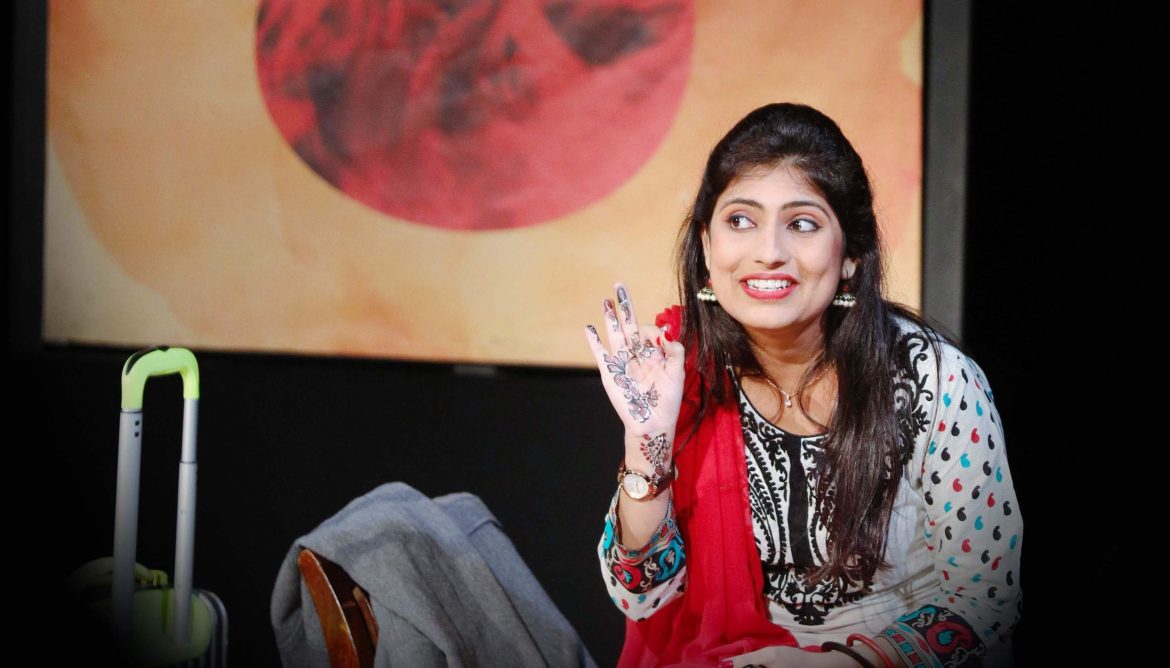A theatre production, called #Womanologues, is a series of monologues by women, under the broad theme of ‘desire’.
Among the stories about a deliriously happy divorcee, and a single woman looking for just the right kind of partner, there was a very amusing and startlingly bold story titled Toral Joshi Tinder (written by Rahul Patel and performed by Tusharika Rajguru).
The eponymous Toral is refreshingly candid about her desires and expects her boyfriend to be good in the sack. When she tires of him, she resorts to the dating app Tinder, and hooks up with a succession of men, with no strings attached. Her work as a tattooist and mehendi artiste keeps her financially secure, so what she looks for in relationships is excitement.
She is practical enough to settle for a fat guy with a BMW, and even learns to cook for him, but eventually, when the wedding is actually upon her, she realizes the BMW is not enough to keep her happy, the man does not satisfy her in bed. So, what’s the point? she asks herself, and flees the mandap, leaving a trail of broken male egos; surprisingly, she gets the support of her otherwise docile mother.
Toral Joshi is the kind who would not “settle down” because it is time to, or because she is afraid of being “left on the shelf.” Films, TV, ads and romantic fiction have placed too much importance in love stories that inevitably lead to marriage, ‘blissful’ motherhood and that ‘happily ever after’ myth.
It would come as no surprise to the growing multitudes of single-by-choice women, that according to an expert in happiness, quoted in The Guardian and several other publications, unmarried and childless women are the happiest subgroup in the population. And they are more likely to live longer than their married and child-rearing peers.
Paul Dolan, a professor of behavioural science at the London School of Economics, said the latest evidence showed that the traditional markers used to measure success did not correlate with happiness – particularly marriage and raising children. “We do have some good longitudinal data following the same people over time, but I am going to do a massive disservice to that science and just say: if you’re a man, you should probably get married; if you’re a woman, don’t bother. Men benefited from marriage because they “calmed down”, he said. “You take less risks, you earn more money at work, and you live a little longer. She, on the other hand, has to put up with that, and dies sooner than if she never married. The healthiest and happiest population subgroup are women who never married or had children.” Dolan’s latest book, Happy Ever After, cites evidence from the American Time Use Survey (ATUS), which compared levels of pleasure and misery in unmarried, married, divorced, separated and widowed individuals.
In a report in refinery29.com, despite the benefits of a single, childless lifestyle for women, Dolan said that the existing narrative that marriage and children were signs of success meant that the stigma could lead some single women to feel unhappy. “You see a single woman of 40, who has never had children – ‘Bless, that’s a shame, isn’t it? Maybe one day you’ll meet the right guy and that’ll change.’ No, maybe she’ll meet the wrong guy and that’ll change. Maybe she’ll meet a guy who makes her less happy and healthy, and die sooner.”
Today, when women have satisfying careers and financial independence, marriage and motherhood, may not hold the same appeal as it did a few decades earlier. Even in supposedly egalitarian marriages to New Men, women found that, whether they like it or not, care for the home and family fell on them. At least, they had to shoulder a larger portion of the blame for things going wrong—husband straying, kid failing in exams or doing drugs and suchlike.
Dolan said in a talk, “If I’ve kind of emboldened people to make different life choices — and not just women who don’t marry or have kids — if I’ve enabled them to be more liberated, then that’s fantastic. I’m not making any prescription about how anyone lives their life, just suggesting that people may want to live differently than what’s expected…The world is a complicated place and we like institutions and order and marriage gives us that order. If single women may not be as miserable as we think them to be, that calls into question the orders and we don’t like that being challenged.”
Harriet Minter writing in The Indepenent.co.uk states, “For this generation of women the dream of having a partner and family has always run alongside the dream of professional success, of intellectual and creative fulfilment. More and more, however, the research shows that’s just not possible. Nearly three-quarters of working mothers say they have experienced some form of discrimination at work and it’s no surprise that the gender pay gap appears at the exact point women start having children. When the price of marriage and babies is saying goodbye to the career you worked so hard in your twenties to forge, it’s not surprising that feelings of isolation and unhappiness follow shortly behind.”
It is a startling statistic, that there are now 71 million single women in India– unmarried, divorced, widowed, separated– which is a 39 percent increase, the numbers rising from 51.2 million in 2001 to 71.4 million in 2011, according to census data. The number could very well be higher now.
But this change—positive, negative or a sign of the times, is open to debate—is still to reflect properly in popular culture—which is why, it is delightful to encounter Toral Joshi in that play—a young woman who knows exactly what she wants. Nobody would dare call her a ‘spinster.’ Bridget Jones and Ally McBeal can go take a hike!
(This piece first appeared in The Free Press Journal dated June 19, 2019)

